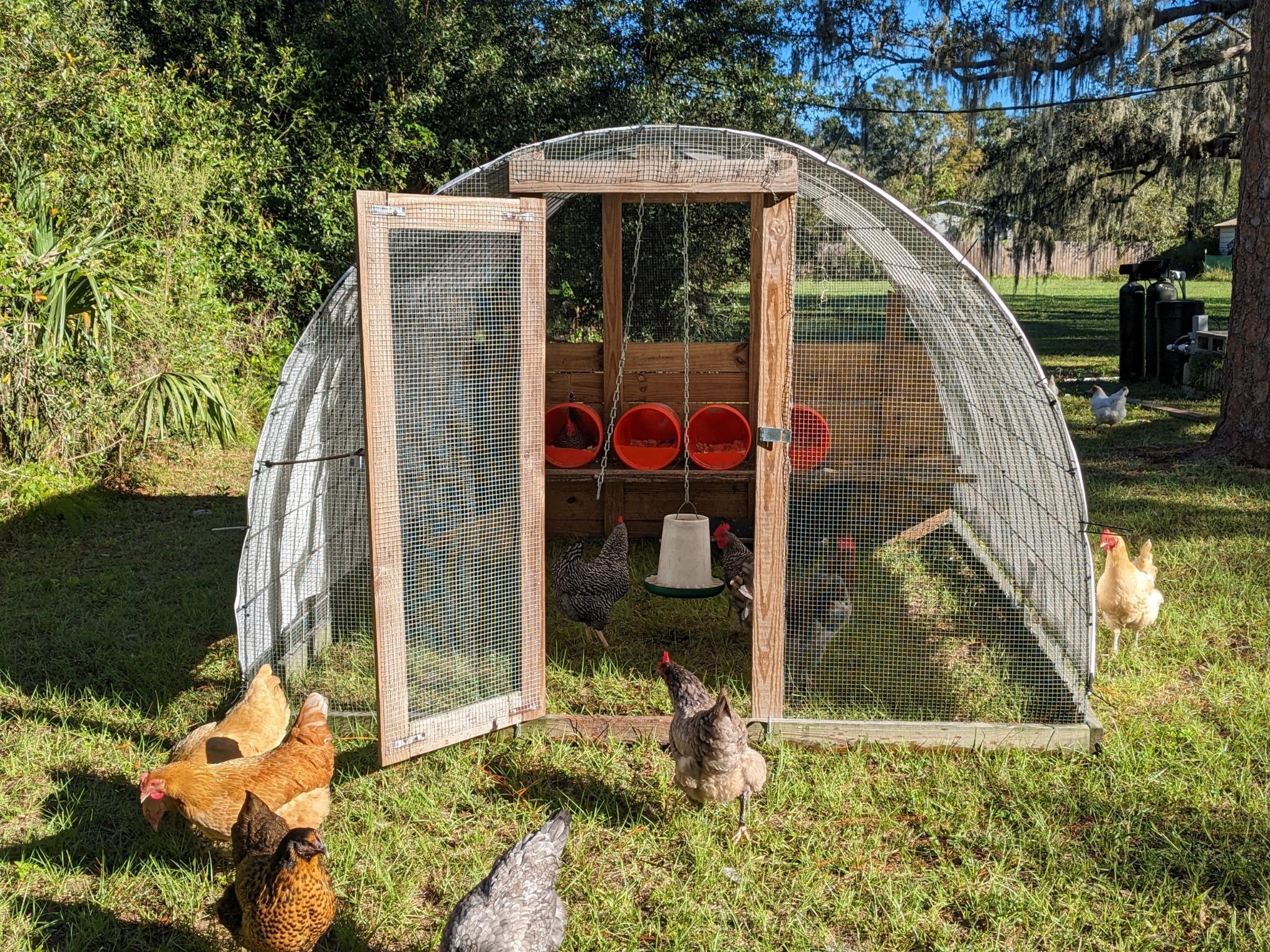How to Get Rid of Ants in the Garden
How to Get Rid of Ants in the Garden
Dealing with ants in the garden can be a long, frustrating process! The deep south seems to be loaded with ants, so I’ve tried almost all the remedies. Some work well, and some…not so much. Here are 5 (effective) ways that I deal with ants in the garden!
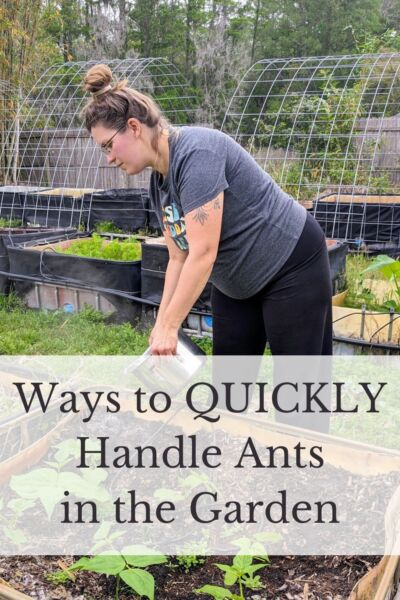
I’m not guaranteeing that these methods are completely safe for you to use on your property or in your garden. I’m simply sharing my own experience and what we choose to do! I encourage you to do your own research and form your own opinions.
Why are ants a problem in the garden?
Ants are fascinating creatures that play a necessary role in our ecosystem, but when they invade your garden in large numbers, they can damage or even kill plants. Not to mention that some types of ants (I’m mostly talking about fire ants, here) can be harmful to children and pets that stumble upon them in the garden.
Will one method work for all types of ants?
The short, answer? No. In my experience, you don’t need to dial it down to the exact species of ant or anything like that. But there is a difference in the way to treat black ants versus fire ants. Fire ants, known for their painful stings and red coloring, typically build large mounds in the garden, while black ants might nest under things like mulch or rocks in your garden. Determining which type of ant you’re dealing with will likely make them much quicker and easier to handle.
Fire Ants
Fire ants can pose a threat to both plants and people, making it a priority to find their mounds and quickly get rid of them. These colonies spread quickly + the ants are aggressive and quick to sting. For me, these things make fire ants enemy #1 in the garden. I’ve got lots of children who love digging in the garden soil with me, and I would hate for them to put their hands straight into a fire ant nest!
Let’s go over three of my favorite methods for dealing with fire ants in the garden:
Dividing the Nest
This is essentially using a shovel to move the colony and whatever they are nesting in to different locations around your property. The theory here is that they will disperse and die off when separated from each other. I will say, I’m not completely sure that they don’t just build little nests in the spots that we put them, but it does alleviate the immediate problem in the garden!
Dividing the nest in this way is a more hands on approach, and I would advise caution when you do it. There is a chance for ants to climb up the shovel or fall on your body as you move them. I personally never gravitate towards this option, but my husband is a fan of just grabbing the shovel and getting it done. So, it may be worth a try!
Boiling Water
This is my go-to first line of defense against fire ants! It’s extremely effective, free to do, and doesn’t introduce any chemicals into the garden. This method is exactly what it sounds like…boil a pot of water, bring it to the garden, and pour the water directly onto the mound where you see the ant traffic. The heat destroys the ants and their eggs, effectively eliminating the colony. You may need to do this a couple times back to back to get all the ants, but it does work!
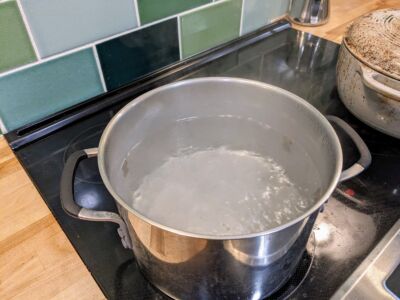
The only drawback to using boiling water on ants in the garden is that it can damage or kill plants nearby. I don’t love that side effect, but it’s worth it to me to keep my kids safe from fire ant bites!
This post contains affiliate links marked with an *, which means I make a small commission at no extra cost to you. Thanks for supporting our homestead!
Fire Ant Poison
If all else fails, I am not opposed to using a specific fire ant poison to get rid of the issue. This is the one* we really like because it works quickly and doesn’t require watering in.
I DO NOT add this to my garden beds. This poison is very strong stuff, and I think it’s obvious why I don’t want that mixed into the soil I grow our food in. However, this is great for areas around the beds, along walkways, and elsewhere on the property. We always keep a bottle or two on hand!
Black Ants
Black ants are typically less aggressive than fire ants but can still become a nuisance, especially when they start farming aphids or scale insects on your plants. Once black ants take hold in a garden bed, it can be especially hard to get rid of them for good. That’s why it’s important to start methods to get rid of these ants as soon as you see they have formed a nest. The quicker your action, the better!
Here are the ways I manage black ants in the garden:
Boiling Water
Just like with fire ants, boiling water can be effective for black ants. For whatever reason, black ants seem to be a bit more resilient to this tactic in my garden, so I do have a few other things I will move to if hot water doesn’t work.
Ant Baits
If boiling water doesn’t work for black ants, I move on to using ant baits* in the garden bed containing the nest. I have found these to be highly effective if placed right next to the mound. It’s not enough to simply place it somewhere in the bed when you see an ant. Do some digging around, find the nest, and place the bait as close to the nest as you can. You may need to replace the original bait station with a new one after a few days if it’s quite a large nest, but using ant baits almost always gets rid of the ants within a few days.
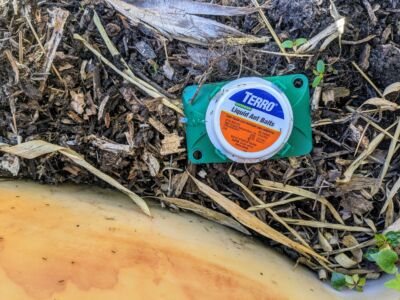
Ant Block Granules
If the other two methods don’t work for eradicating black ants in my garden, I’ll move to using ant block granules around the beds and walkways. This product is something I only use OUTSIDE the beds as it’s not something I want in the same soil as my garden veggies. Applying something like this around the perimeter of your garden or beds can kill ants that are present and also may help prevent black ants from invading in the first place.
Related Posts
How to Fertilize Your Garden Without Store-Bought Fertilizers
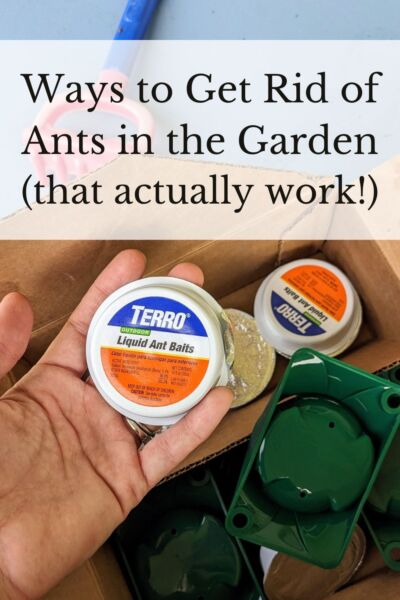
There you have it, my top strategies for dealing with ants in the garden! The key is to get a handle on the problem as soon as possible to prevent the ants from getting out of hand. Do you have another method that you’ve found to be effective in battling garden ants? Let us know in the comments below!
